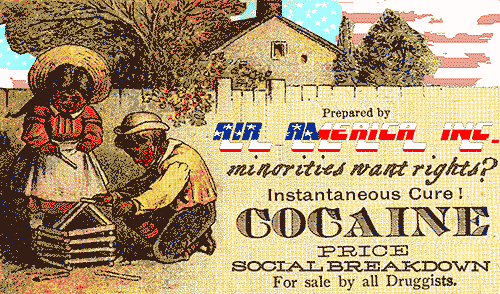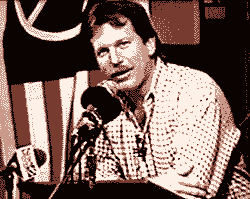Drugs Trafficking and the CIA: Has it Ended?
&
Who Killed Gary Webb?

by Robert Allen & C.D. Stelzer
|
Drugs Trafficking and the CIA: Has it Ended?
Changes in US policy in recent years would appear
to indicate that the role of the Central
Intelligence Agency in the war on drugs has been
curtailed [see Eradicating the Global Heroin
Trade in Review, below]. Since the CIA admitted
to US Congress in 2000 that its operatives were
involved in drugs trafficking in central and
south America, the fallout has damaged the
agency, boosted the work of anti-drugs groups and
vindicated the work of journalists like Gary Webb.
|
 The CIA, according to files released by the CIA
and the US Justice Department, used major
traffickers as agents, contractors and assets,
and protected traffickers the Justice Department
sought to prosecute. It is believed that profits
from the CIA's cocaine, heroin, and marijuana
trafficking were somewhere between $10 and $15
billion per year.
Webb's persistent revelations in the mid-to-late
1990s that the CIA was involved in drugs
trafficking to communities in US cities, towns
and villages have been corroborated by many of
the sources Chellis Glendinning uses in Chiva,
her book on the global heroin trade [see
Reclamation in the Face of Globalization:
Fighting the Global Heroin Trade].
Glendinning's New Mexico sources had personal
experience of drugs ghettos in US cities,
especially Los Angeles, where dealers admitted to
Webb that the CIA was their supplier. "The crack
market in South Central L.A. - the nation's first
and biggest - was begun and supplied for almost a
decade by a drug ring connected to the Nicaraguan
Contras, and that these traffickers were in
direct contact with CIA agents before and after
they started selling cocaine in L.A.," Webb told
David Peterson of Chicago Media Watch in August
1997 [see http://www.wethepeople.la/webb2.htm
].
The CIA’s history with drugs operations go back
to the middle of the 20th century and show that
there were agendas other than the funding of
warlords in the suppression of communism. As Webb
discovered, the importation of cocaine, heroin,
and marijuana into US cities was also an attempt
to suppress another threat. Glendinning is not
the first researcher to realise that drugs played
a huge part in the suppression of political
groups like the Black Panthers and the American
Indian Movement. "For many," she writes, "the
arrival of the drug world into America's
disaffected communities was another form of
colonisation, putting the final strangehold on
whatever community ties to land, community, and
family were still gasping for breath."
In the place of community appeared the ghetto and
in the ghetto drugs were king. Michael C.
Ruppert, a former Los Angeles Police narcotics
detective, author of Crossing the Rubicon: The
Decline of the American Empire at the End of the
Age of Oil and the FromtheWilderness
website,
saw that for himself and soon made the
connections with the CIA, that they had been
dealing drugs in their own country "for a long
time". Ruppert had allies in high places.
Ruppert, like Webb and others, had touched a
sensitive nerve [see The Gary Webb Interview,
below].
"Ross Perot [presidental candidate in 1992]
called me: 'Mike, I must know forty or fifty
former military officers and law enforcement
personnel who have discovered what you have. They
have all had their lives ruined, been called
crazy and forced into poverty. You'd think they'd
do something different once in a while but they
don't because it works,'" Ruppert told the Select
Intelligence Committees of both Houses in March 1997.
Ruppert has not been forced into poverty, and he
does not believe that US policy has changed, that
the CIA is still wearing the drug emperor's
clothes. When it was revealed that Afghanistan's
opium production for 2002 was 36 times higher
than at the end of Taliban rule Ruppert could see
why the markets were improving, "with almost $600
billion in drug money being laundered through
Wall Street and US banks". "Not every US policy
overseas is a failure. Hamid Karzai [the
Afghanistan President] controls a few square
blocks of Kabul. But CIA-controlled warlords
control the real estate that really matters."
The CIA, according to files released by the CIA
and the US Justice Department, used major
traffickers as agents, contractors and assets,
and protected traffickers the Justice Department
sought to prosecute. It is believed that profits
from the CIA's cocaine, heroin, and marijuana
trafficking were somewhere between $10 and $15
billion per year.
Webb's persistent revelations in the mid-to-late
1990s that the CIA was involved in drugs
trafficking to communities in US cities, towns
and villages have been corroborated by many of
the sources Chellis Glendinning uses in Chiva,
her book on the global heroin trade [see
Reclamation in the Face of Globalization:
Fighting the Global Heroin Trade].
Glendinning's New Mexico sources had personal
experience of drugs ghettos in US cities,
especially Los Angeles, where dealers admitted to
Webb that the CIA was their supplier. "The crack
market in South Central L.A. - the nation's first
and biggest - was begun and supplied for almost a
decade by a drug ring connected to the Nicaraguan
Contras, and that these traffickers were in
direct contact with CIA agents before and after
they started selling cocaine in L.A.," Webb told
David Peterson of Chicago Media Watch in August
1997 [see http://www.wethepeople.la/webb2.htm
].
The CIA’s history with drugs operations go back
to the middle of the 20th century and show that
there were agendas other than the funding of
warlords in the suppression of communism. As Webb
discovered, the importation of cocaine, heroin,
and marijuana into US cities was also an attempt
to suppress another threat. Glendinning is not
the first researcher to realise that drugs played
a huge part in the suppression of political
groups like the Black Panthers and the American
Indian Movement. "For many," she writes, "the
arrival of the drug world into America's
disaffected communities was another form of
colonisation, putting the final strangehold on
whatever community ties to land, community, and
family were still gasping for breath."
In the place of community appeared the ghetto and
in the ghetto drugs were king. Michael C.
Ruppert, a former Los Angeles Police narcotics
detective, author of Crossing the Rubicon: The
Decline of the American Empire at the End of the
Age of Oil and the FromtheWilderness
website,
saw that for himself and soon made the
connections with the CIA, that they had been
dealing drugs in their own country "for a long
time". Ruppert had allies in high places.
Ruppert, like Webb and others, had touched a
sensitive nerve [see The Gary Webb Interview,
below].
"Ross Perot [presidental candidate in 1992]
called me: 'Mike, I must know forty or fifty
former military officers and law enforcement
personnel who have discovered what you have. They
have all had their lives ruined, been called
crazy and forced into poverty. You'd think they'd
do something different once in a while but they
don't because it works,'" Ruppert told the Select
Intelligence Committees of both Houses in March 1997.
Ruppert has not been forced into poverty, and he
does not believe that US policy has changed, that
the CIA is still wearing the drug emperor's
clothes. When it was revealed that Afghanistan's
opium production for 2002 was 36 times higher
than at the end of Taliban rule Ruppert could see
why the markets were improving, "with almost $600
billion in drug money being laundered through
Wall Street and US banks". "Not every US policy
overseas is a failure. Hamid Karzai [the
Afghanistan President] controls a few square
blocks of Kabul. But CIA-controlled warlords
control the real estate that really matters."
-
– Robert Allen

Who Killed Gary Webb?
Introduction by C.D. Stelzer:
The details of the CIA's complicity in global drug
trafficking first appeared Alfred McCoy's 1972 book
The Politics of Heroin in Southeast Asia, which has
since been updated to include the intelligence
agency's involvement in the drug trade in Afghanistan
dating back to the Reagan administration's covert war
against the former Soviet Union's occupation of that
country.
McCoy's seminal work was followed in 1985 by Martin A.
Lee and Bruce Shlain's Acid Dreams, an expose on the
agency's pervasive use of LSD for mind control.
Around this time, then-Associated Press reporter
Robert Parry also revealed details of the the U.S.
government's drug-funded covert war against the
Sandinista government in Nicaragua. As a consequence,
his career path took a downward spiral.
Over and over again, American journalists who choose
to challege the CIA have met similar ends. A decade
after Parry's courageous reporting, Pulitzer
Prize-winning San Jose Mercury News reporter Gary
Webb picked up the trail, revealing in a series of
stories the links between the CIA's support of
Nicaraguan Contra cocaine trafficking and the crack
cocaine epidemic that plagued East Los Angeles in the
1990s.
In American corporate journalism, revelations that
uncover such unscrupulous actions by U.S. intelligence
agencies are obviously the exception to the rule. In
quick order, Webb's reporting was subjected to vicious
attacks from within his own profession by journalists
at the New York Times and Washington Post; the same
journalists who rely day-to-day on their trusted CIA
sources to provide them with leaks that inevitably
bolster the agency's version of events.
Under pressure, Webb's editors disavowed his reporting
and banished him to reporting local news, which
ultimately led to his resignation. Webb's 1998 book,
Dark Alliance, based on his controversial newspaper
series of the same name, met mixed reviews and had
limited sales. When St. Louis freelance journalist
Phil Gounis and I interviewed him in August 1998, Webb
had taken a job as a spokesman for a state government
agency in California. At this juncture, much of what
Webb had previously reported had been or would soon be
validated in large measure by admissions from the CIA
itself, but the confirmation came too late to salvage
the damage sustained to his professional credibility.
Indeed, Webb had become a pariah even among editors of
the "alternative" press within the U.S. A story idea
based on the telephone interview that Gounis and I
conducted with Webb was summarily killed by the
then-managing editor of the Riverfront Times in St.
Louis with little or no explanation. By no small
coincidence, a month later, the local publisher of
this once-fiercely independent newspaper announced its
pending sale of to New Times Inc., a corporate
behemoth known for placing a priority on profit over
investigative reporting.
Webb never regained his lost prowess. At the time of
his death in December 2004, he was working for a small
weekly newspaper in California and had reportedly
begun to once again look into the CIA's dark
alliances. Local authorities unflinchingly ruled his
death a suicide even though he had been shot not once
but twice in the head.
C.D.Stelzer
St. Louis, Mo., USA
April 2005
THE GARY WEBB INTERVIEW

by Philip Gounis and C.D. Stelzer
The following telephone interview with the late
Gary Webb took place in 1998, six years before
Webb's death. The entire 44 minute interview is
presented in 11 segments.
Webb was furrowing deep into the toxic landscape
of covert government operations. Investigating
drug smuggling in the Contra world is an
extremely dangerous business and when you uncover
information that links the Contras to the CIA and
the CIA to a scheme to distribute drugs in the
US, it's quite possible that it may turn deadly.
If nothing else the interview will challenge your
perceptions of just how much the American
government may be involved in drug smuggling to
fund covert operations and the crack epidemic
which to this day is a nationwide tragedy.
At one point in the interview Webb says, "Don't
take my word look into it yourself." The
following
Gary Webb - Word Warrior
is as good a place to start as any.
Click below to hear the audio interview with Webb:
http://eshot.blogspot.com/

|


 The CIA, according to files released by the CIA
and the US Justice Department, used major
traffickers as agents, contractors and assets,
and protected traffickers the Justice Department
sought to prosecute. It is believed that profits
from the CIA's cocaine, heroin, and marijuana
trafficking were somewhere between $10 and $15
billion per year.
Webb's persistent revelations in the mid-to-late
1990s that the CIA was involved in drugs
trafficking to communities in US cities, towns
and villages have been corroborated by many of
the sources Chellis Glendinning uses in Chiva,
her book on the global heroin trade [see
The CIA, according to files released by the CIA
and the US Justice Department, used major
traffickers as agents, contractors and assets,
and protected traffickers the Justice Department
sought to prosecute. It is believed that profits
from the CIA's cocaine, heroin, and marijuana
trafficking were somewhere between $10 and $15
billion per year.
Webb's persistent revelations in the mid-to-late
1990s that the CIA was involved in drugs
trafficking to communities in US cities, towns
and villages have been corroborated by many of
the sources Chellis Glendinning uses in Chiva,
her book on the global heroin trade [see


